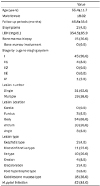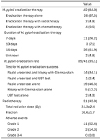This article has been corrected. See "Radiation Therapy for the Treatment of Gastric Mucosa-Associated Lymphoid Tissue Lymphoma" in Volume 73 on page 1.
Abstract
Background/Aims
The eradication of Helicobacter pylori (H. pylori) is an effective treatment in gastric mucosa-associated lymphoid tissue (MALT) lymphoma associated with H. pylori infection. However, the treatment strategy in gastric MALT lymphoma patients who are H. pylori-negative or unresponsive to H. pylori eradication therapy remains controversial. In this study, we investigated the clinical efficacy of treatments other than H. pylori eradication therapy in these groups of patients.
Methods
This was a retrospective single-center study based on the medical records of patients diagnosed with gastric MALT lymphoma at Yeungnam University Medical Center between January 2005 and December 2016. Patients were treated with H. pylori eradication therapy, chemotherapy, or radiotherapy according to their H. pylori infection status and stage of gastric MALT lymphoma.
Results
Of the 68 eligible patients, 50 were enrolled in the study. Of the 42 patients with H. pylori-positive gastric MALT lymphoma, 36 (81.7%) were treated with H. pylori eradication therapy as primary treatment and 25 (69.4%) achieved a complete response (CR). Patients without a CR after H. pylori eradication therapy (n=11, 30.6%) received radiotherapy as a secondary treatment. Two patients with H. pylori-positive gastric MALT lymphoma and eight with H. pylori-negative gastric MALT lymphoma received radiotherapy as the primary treatment. CR was achieved in all 21 patients treated with radiotherapy as primary or secondary treatment. The 5-year progression-free survival rate after radiotherapy was 92.9%.
Figures and Tables
 | Fig. 1Treatment pathway and outcomes for patients. In total 50 patients, 42 patients (84.0%) had H. pylori infection. Eleven patients with no-CR after H. pylori eradication therapy received radiotherapy as secondary treatment and all achieved CR without relapse. Eight patients with H. pylori-negative gastric MALT lymphoma were treated with radiotherapy as the primary treatment and the CR rate after radiotherapy was 100%. MALT, mucosa-associated lymphoid tissue; H. pylori, Helicobacter pylori; RTx, radiotherapy; CTx, chemotherapy; CR, complete response. |
 | Fig. 2Progression-free survival rates after treatment. 5-year progression-free survival rate of all patients was 91.1%. Median survival period after all treatments was 7.4 months (range, 4.3–19.3 months). 5-year progression-free survival rate after radiotherapy was 92.3%. Median survival period after radiotherapy was 34.6 months (range, 9.8–133.6 months). RTx, radiotherapy. |
Notes
References
1. A clinical evaluation of the international lymphoma study group classification of non-Hodgkin's lymphoma. The non-Hodgkin's lymphoma classification project. Blood. 1997; 89:3909–3918.

2. Olszewski AJ, Castillo JJ. Survival of patients with marginal zone lymphoma: analysis of the surveillance, epidemiology, and end results database. Cancer. 2013; 119:629–638.

3. Ruskoné-Fourmestraux A, Fischbach W, Aleman BM, et al. EGILS consensus report. Gastric extranodal marginal zone B-cell lymphoma of MALT. Gut. 2011; 60:747–758.


4. Zucca E, Copie-Bergman C, Ricardi U, et al. Gastric marginal zone lymphoma of MALT type: ESMO clinical practice guidelines for diagnosis, treatment and follow-up. Ann Oncol. 2013; 24:Suppl 6. vi144–vi148.

5. Zullo A, Hassan C, Cristofari F, et al. Effects of Helicobacter pylori eradication on early stage gastric mucosa-associated lymphoid tissue lymphoma. Clin Gastroenterol Hepatol. 2010; 8:105–110.


6. Ono S, Kato M, Takagi K, et al. Long-term treatment of localized gastric marginal zone B-cell mucosa associated lymphoid tissue lymphoma including incidence of metachronous gastric cancer. J Gastroenterol Hepatol. 2010; 25:804–809.


7. Nakamura S, Sugiyama T, Matsumoto T, et al. Long-term clinical outcome of gastric MALT lymphoma after eradication of Helicobacter pylori: a multicentre cohort follow-up study of 420 patients in Japan. Gut. 2012; 61:507–513.

8. Wirth A, Gospodarowicz M, Aleman BM, et al. Long-term outcome for gastric marginal zone lymphoma treated with radiotherapy: a retrospective, multi-centre, international extranodal lymphoma study group study. Ann Oncol. 2013; 24:1344–1351.


9. Ruskoné-Fourmestraux A, Matysiak-Budnik T, Fabiani B, et al. Exclusive moderate-dose radiotherapy in gastric marginal zone B-cell MALT lymphoma: results of a prospective study with a long term follow-up. Radiother Oncol. 2015; 117:178–182.


10. Lévy M, Copie-Bergman C, Gameiro C, et al. Prognostic value of translocation t(11;18) in tumoral response of low-grade gastric lymphoma of mucosa-associated lymphoid tissue type to oral chemotherapy. J Clin Oncol. 2005; 23:5061–5066.


11. Ikoma N, Badgwell BD, Mansfield PF. Multimodality treatment of gastric lymphoma. Surg Clin North Am. 2017; 97:405–420.


12. Rohatiner A, d'Amore F, Coiffier B, et al. Report on a workshop convened to discuss the pathological and staging classifications of gastrointestinal tract lymphoma. Ann Oncol. 1994; 5:397–400.


13. Wotherspoon AC, Doglioni C, Diss TC, et al. Regression of primary low-grade B-cell gastric lymphoma of mucosa-associated lymphoid tissue type after eradication of Helicobacter pylori. Lancet. 1993; 342:575–577.


14. Kim JS, Chung SJ, Choi YS, et al. Helicobacter pylori eradication for low-grade gastric mucosa-associated lymphoid tissue lymphoma is more successful in inducing remission in distal compared to proximal disease. Br J Cancer. 2007; 96:1324–1328.



15. Zullo A, Hassan C, Andriani A, et al. Eradication therapy for Helicobacter pylori in patients with gastric MALT lymphoma: a pooled data analysis. Am J Gastroenterol. 2009; 104:1932–1937. quiz 1938.


16. Choi YJ, Lee DH, Kim JY, et al. Low grade gastric mucosa-associated lymphoid tissue lymphoma: clinicopathological factors associated with Helicobacter pylori eradication and tumor regression. Clin Endosc. 2011; 44:101–108.
17. Ryu KD, Kim GH, Park SO, et al. Treatment outcome for gastric mucosa-associated lymphoid tissue lymphoma according to Helicobacter pylori infection status: a single-center experience. Gut Liver. 2014; 8:408–414.

18. NCCN Guidelines. [Internet]. Plymouth Meeting (PA): National Comprehensive Cancer Network;updated 2018 May 15. cited 2018 Jul 2. Available from: https://www.nccn.org/professionals/physician_gls/pdf/b-cell.pdf.
19. Asenjo LM, Gisbert JP. Prevalence of Helicobacter pylori infection in gastric MALT lymphoma: a systematic review. Rev Esp Enferm Dig. 2007; 99:398–404.

20. Wündisch T, Thiede C, Morgner A, et al. Long-term follow-up of gastric MALT lymphoma after Helicobacter pylori eradication. J Clin Oncol. 2005; 23:8018–8024.


21. Thieblemont C, Zucca EA. Clinical aspects and therapy of gastrointestinal MALT lymphoma. Best Pract Res Clin Haematol. 2017; 30:109–117.


22. Akamatsu T, Mochizuki T, Okiyama Y, Matsumoto A, Miyabayashi H, Ota H. Comparison of localized gastric mucosa-associated lymphoid tissue (MALT) lymphoma with and without Helicobacter pylori infection. Helicobacter. 2006; 11:86–95.


23. Choi YJ, Kim N, Paik JH, et al. Characteristics of Helicobacter pyloripositive and Helicobacter pylori-negative gastric mucosa-associated lymphoid tissue lymphoma and their influence on clinical outcome. Helicobacter. 2013; 18:197–205.

24. Gong EJ, Ahn JY, Jung HY, et al. Helicobacter pylori eradication therapy is effective as the initial treatment for patients with H. pylori-negative and disseminated gastric mucosa-associated lymphoid tissue lymphoma. Gut Liver. 2016; 10:706–713.


25. Vrieling C, de Jong D, Boot H, de Boer JP, Wegman F, Aleman BM. Long-term results of stomach-conserving therapy in gastric MALT lymphoma. Radiother Oncol. 2008; 87:405–411.


26. Tsang RW, Gospodarowicz MK, Pintilie M, et al. Localized mucosa-associated lymphoid tissue lymphoma treated with radiation therapy has excellent clinical outcome. J Clin Oncol. 2003; 21:4157–4164.


27. Goda JS, Gospodarowicz M, Pintilie M, et al. Long-term outcome in localized extranodal mucosa-associated lymphoid tissue lymphomas treated with radiotherapy. Cancer. 2010; 116:3815–3824.


28. Abe S, Oda I, Inaba K, et al. A retrospective study of 5-year outcomes of radiotherapy for gastric mucosa-associated lymphoid tissue lymphoma refractory to Helicobacter pylori eradication therapy. Jpn J Clin Oncol. 2013; 43:917–922.


29. Kim SW, Lim DH, Ahn YC, et al. Clinical outcomes of radiation therapy for early-stage gastric mucosa-associated lymphoid tissue lymphoma. World J Gastroenterol. 2013; 19:6062–6068.



30. Yahalom J. Patients with H pylori-independent MALT lymphoma are curable with radiotherapy. Oncology (Williston Park). 2011; 25:1147–1149.

31. Schechter NR, Yahalom J. Low-grade MALT lymphoma of the stomach: a review of treatment options. Int J Radiat Oncol Biol Phys. 2000; 46:1093–1103.


32. Heo J, Jeon SW. Changes in the eradication rate of conventional triple therapy for Helicobacter pylori infection in Korea. Korean J Gastroenterol. 2014; 63:141–145.





 PDF
PDF ePub
ePub Citation
Citation Print
Print






 XML Download
XML Download